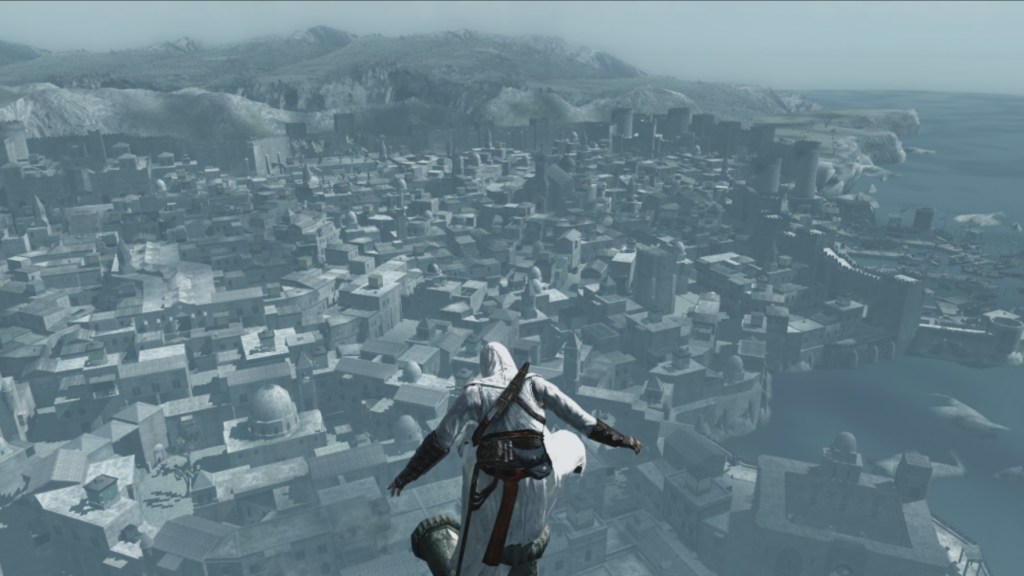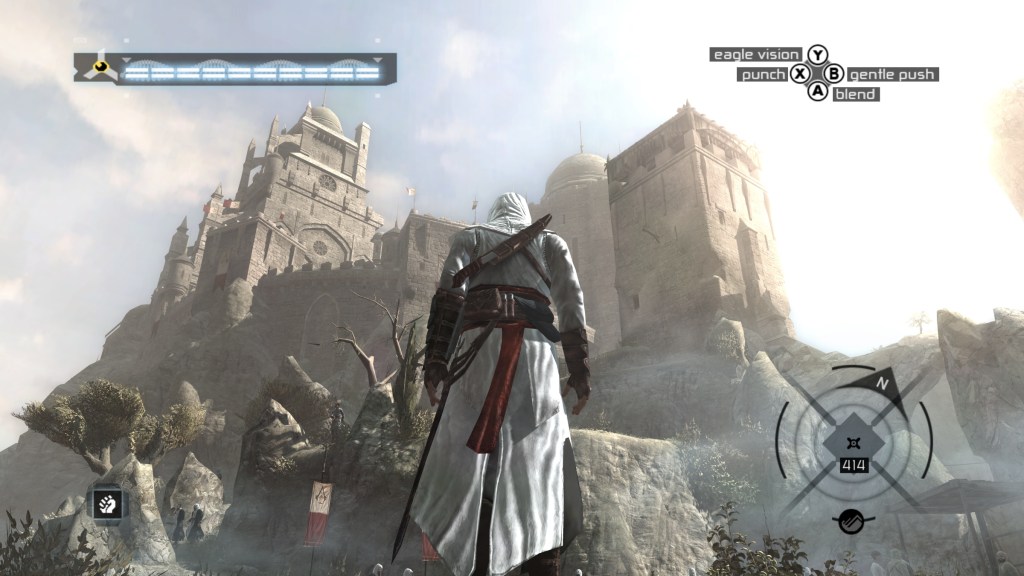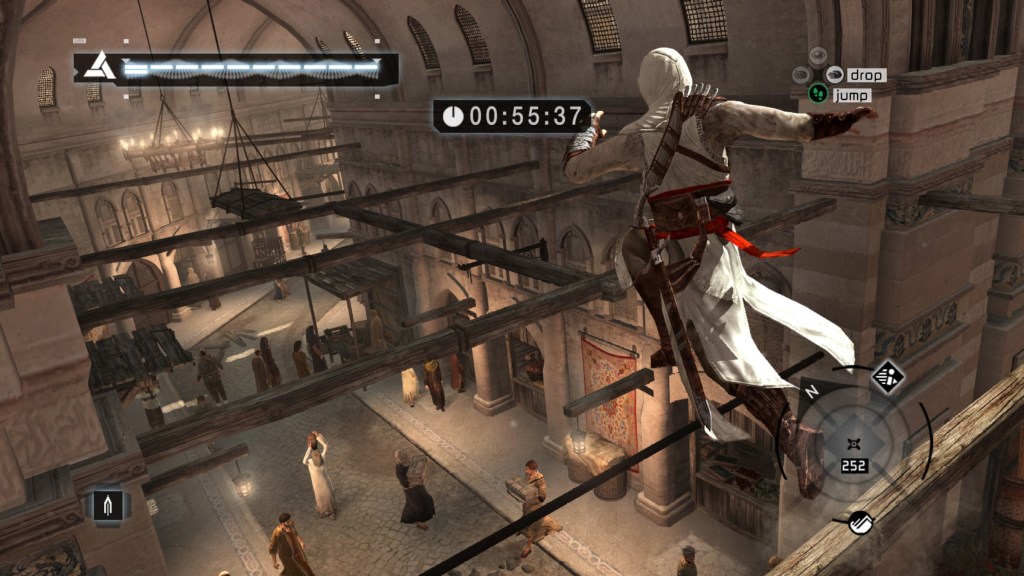18 years ago today, Assassin’s Creed debuted and became a massive success for Ubisoft. Focusing on the eternal war between the Order of Assassins and the Templar Knights, the franchise has consisted of 31 games across over a dozen platforms. It’s become one of the signature gaming franchises of the 21st century, with everything good and bad that entails. With a global fan base and hundreds of millions in profits, Assassin’s Creed stands tall as one of the ten most successful franchises in gaming history.
Videos by ComicBook.com
This makes the history of the game all the more intriguing, as it was all originally meant as a spin-off of another video game franchise. In the years since, however, Assassin’s Creed has dwarfed the original in terms of pop-culture impact and overall success. Here’s how Assassin’s Creed evolved from a next-gen Prince of Persia into a global phenomenon, and how it continues to succeed in the gaming ecosystem almost two decades since it launched.
Assassin’s Creed Was The Right Game For The Right Time

18 years ago, Assassin’s Creed was a massive success for Ubisoft, and remains one of their most profitable modern franchises. Notably, the series almost never fully came to be. After the success of Prince of Persia: The Sands of Time, creative director Patrice Désilets began work on a potential sequel to be released as part of the then-upcoming seventh generation of consoles. While that Prince of Persia game got two direct sequels, Désilets and his team shifted their focus to an entirely new idea.
The core concept was set to explore the Order of Assassins in that world’s backstory, focusing on a prince and another playable character who would be striving to take over the organization. As development continued and the assassin concept quickly overtook the typical codifiers of the Prince of Persia franchise, Ubisoft executives had to be convinced to embrace a completely new direction.
By 2006, however, Ubisoft finally sided with the developers and formally announced Assassin’s Creed as a new stand-alone series. The prince character was completely dropped in lieu of Altaïr Ibn-LaʼAhad, a member of the Elements of that connection can still be found in the original concept, such as the inclusion of a time-hopping story mechanic that stemmed from the Sands of Time.
Putting a heavier emphasis on the stealth action and now open to embrace a more morally complex storyline than the straightforward heroics of the Prince of Persia series, Assassin’s Creed established a winding legacy of Assassins from all over the world through the use of the Animus technology framing device. With an eye towards the past and the future, along with an embrace of sci-fi concepts alongside historical action, Assassin’s Creed was a historical epic that never lost sight of the central characters.
How Assassin’s Creed Went From One-Off Success To Major Franchise

Assassin’s Creed launched on the PlayStation 3 and Xbox 360 on November 13, 2007. Set in an open-world environment that encouraged inventive approaches to stealthy assassinations, Assassin’s Creed gave the players a massive world to explore and nine targets to pick off. Met with strong reviews by critics, Assassin’s Creed won several gaming awards. Perhaps more importantly, Assassin’s Creed was a massive financial success. By 2009, the game had sold over 8 million copies worldwide, earning a platinum sales award in the United Kingdom for both the PS3 and Xbox 360 launches.
This success spurred a new development cycle for a sequel, which quickly turned into a massive franchise. Within two years, there was a prequel for the Nintendo DS and mobile platforms, as well as a formal sequel with Assassin’s Creed II. The sequel did even better than the first game, building on the solid debut to deliver a massive success in a crowded field. Thanks to the loose historical connections between possible figures in the story, the series quickly embraced a branching storytelling path that allowed subsequent sequels to establish new characters all around the world. This also impacted gameplay tweaks and encouraged reinvention from the developers, leading to clever tweaks like the pirate-themed Assassin’s Creed IV: Black Flag or the multiplayer focus of Assassin’s Creed Unity. The Assassin’s Creed series, originally just meant to be another Prince of Persia sequel, evolved into one of Ubisoft’s biggest in-house hits.
Assassin’s Creed Was Part Of A Major Shift In Gaming

The successful launch of Assassin’s Creed, alongside other new IP from the era like Gears of War, helped highlight that new blood in the gaming space could be beneficial for developers, companies, and players alike. Assassin’s Creed‘s ability to hop to different time periods offered an exciting excuse to reinvent the franchise with each entry, while also making occasional returns to established characters all the more special. It spoke to creative new approaches to game storytelling, with the expansive sci-fi plot and historical drama all connected through grounded modern-day characters like bartender Desmond Miles.
Assassin’s Creed also serves as a case study on many of gaming’s struggles in the 21st century, whether that be overexposure of a successful franchise and the need to push developers to the brink to deliver ahead of scheduled releases. It even serves as one of the key modern examples of how a gaming franchise can be adapted to other media, albeit with some stumbles, thanks to 2016’s Assassin’s Creed film starring Michael Fassbender. Since it launched 18 years ago today, Assassin’s Creed has released 31 titles.
It’s a staggering and crucial part of modern gaming, highlighting an increased emphasis on morally grey protagonists and speaking to the counter-heavy combat that has become the norm in most modern adventure games. Looking back at the origins of the title, it’s all the more shocking in retrospect. One of gaming’s biggest successes in the 21st century was almost part of a very different franchise — and because of Ubisoft’s decision to acquiesce to the developer’s concept over the easy money of established IP, they ended up with one of the biggest hits in the publisher’s history. 18 years on, Assassin’s Creed‘s success is a reminder that the gaming public can not only get behind a new franchise, but turn it into something special.








